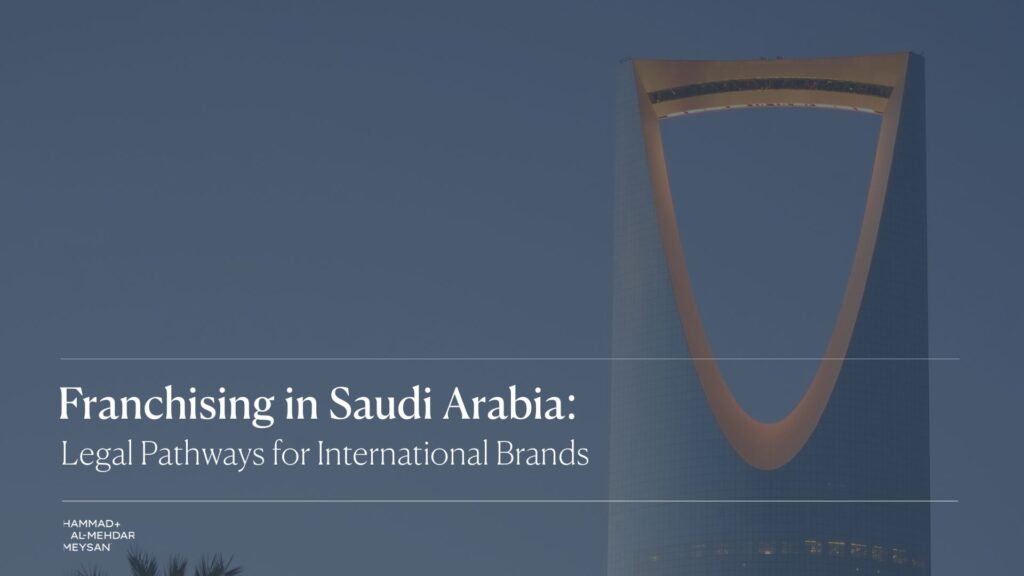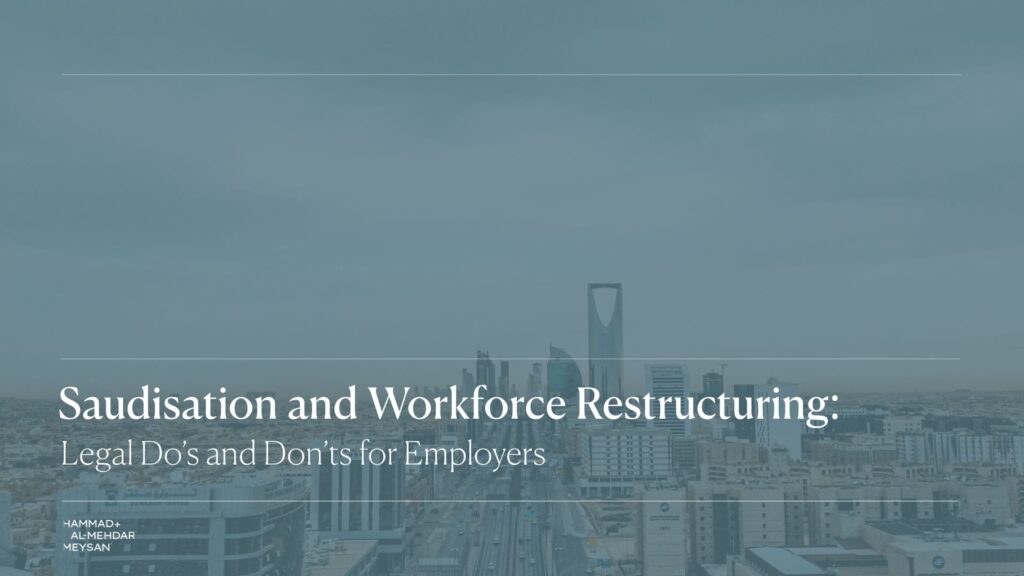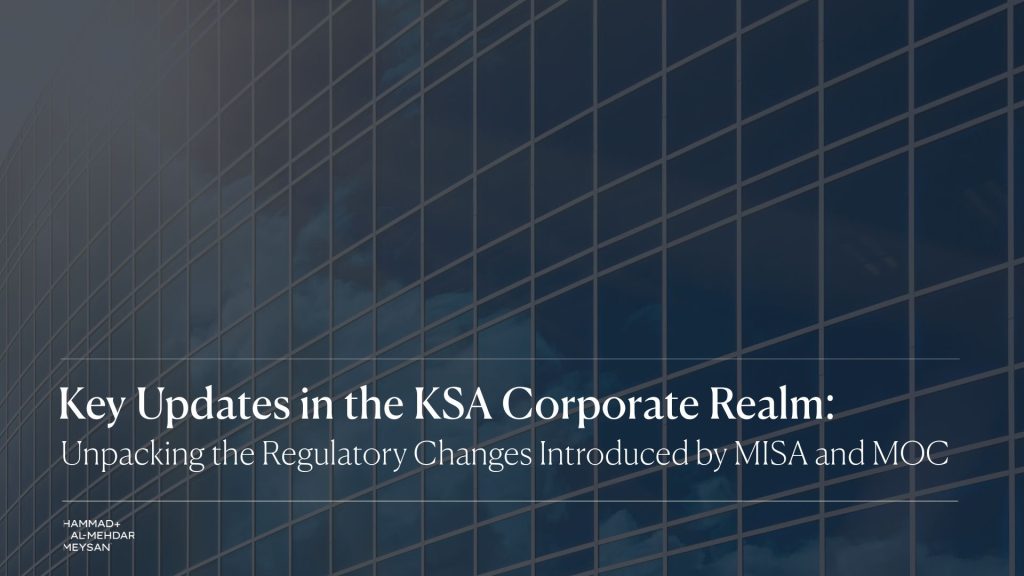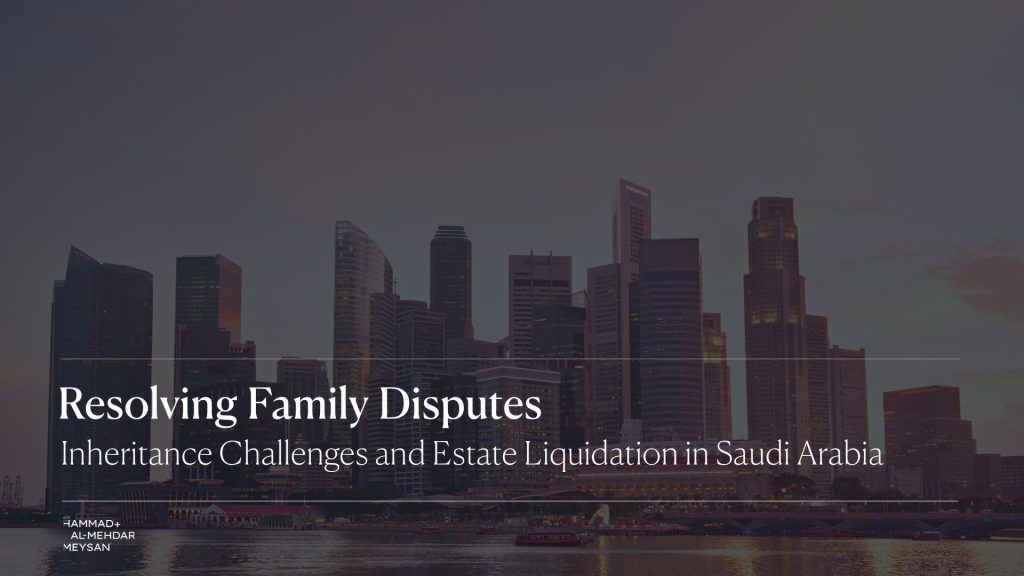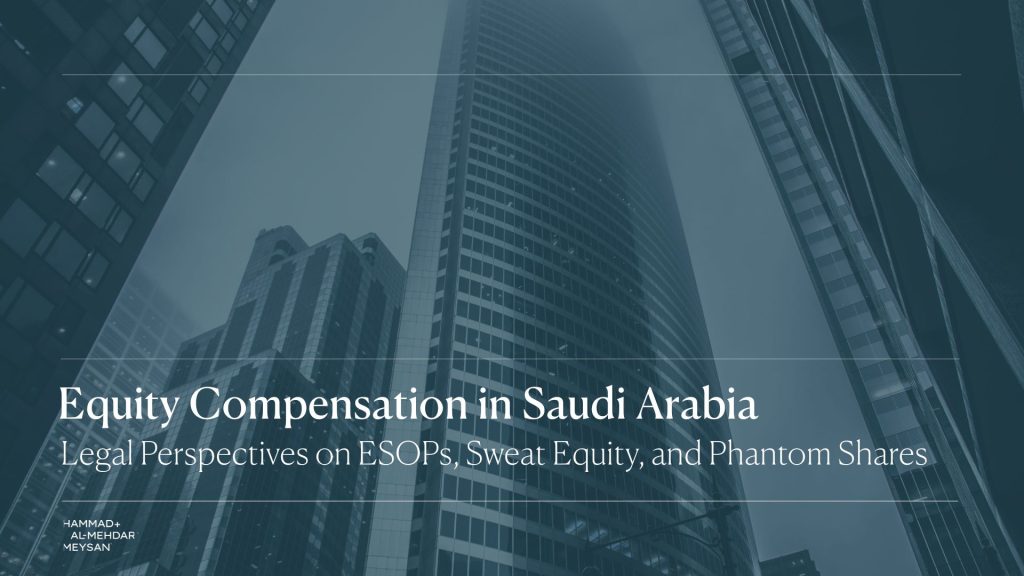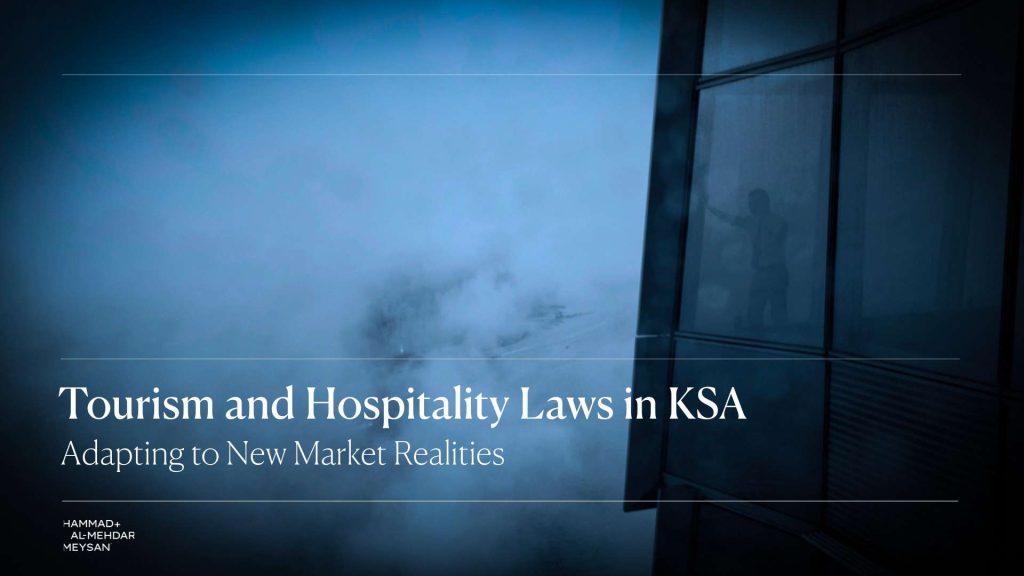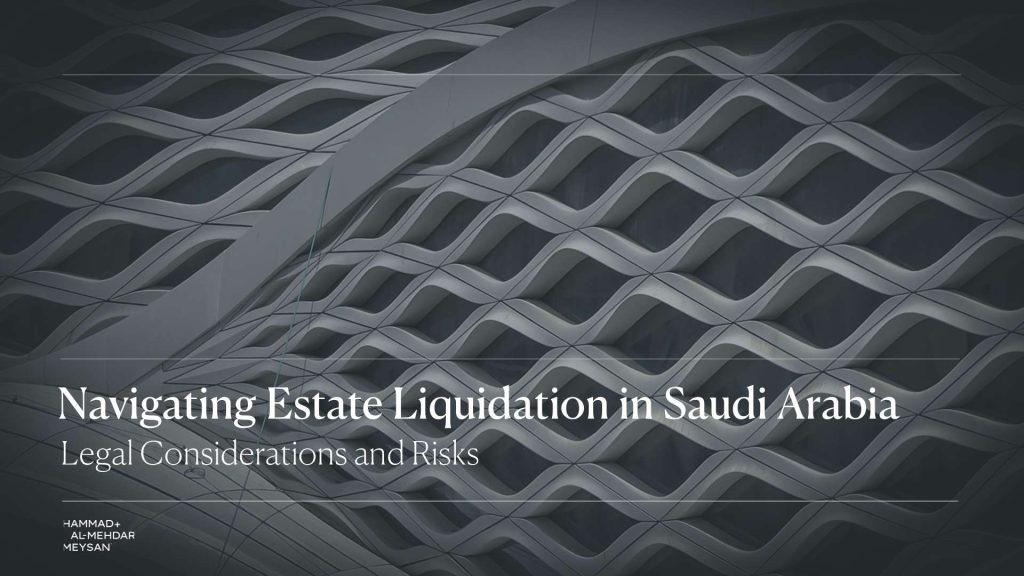The Ministry of Investment of Saudi Arabia (“MISA”) and The Ministry of Commerce (“MOC”) recently rolled out key legislation shaping how businesses in the Kingdom of Saudi Arabia (“KSA”) undertake their legal forms and their commercial activities aimed at streamlining incorporation and administrative costs on investors. With that said, certain procedures and requirements introduced by both MISA and MOC increased their regulatory oversight by promoting further disclosures or streamlining licensing parameters. This article aims to identify the major introductions investors and commercial entities should take mind of, while also acknowledging the complementary interplay between both MISA and MOC’s legislative actions.
Following the promulgation of the new Investment Law, issued by Royal Decree No. (M/19) dated 16/01/1446 H (corresponding to 22/07/2024 G) (“Investment Law”), MISA released the updated twelfth edition of the Investor Guide in 2025 (“Investor Guide”). This edition effectively replaces previous versions regarding the classification of licenses, although the requirements associated with such licenses remain unchanged. Subsequently, the new Implementing Regulations of the Investment Law was issued pursuant to Minister of Investor Ministerial Resolution No. (1086) dated 08/08/1446 H (corresponding to 07/02/2025 G) (“Investment Regulations”).
Additionally, the MOC introduced new requirements for commercial entities under the Commercial Register Law, issued by Royal Decree No. (M/83) dated 19/03/1446 H (corresponding to 22/09/2024 G) (“CR Law”), which took effect on 3 April 2025.
Part I: MISA – Out With the Old and in With the New?
Under the previous editions of the investor guides, MISA had several classifications for the types of licenses foreign investors could procure, which fell under the following: (1) Service License, (2) Industrial License, (3) Commercial License (a) with a Saudi partner or (b) wholly foreign-owned, (4) Scientific and Technical Office, (5) Real Estate License (6) Temporary License for Undertaking Governmental Projects, (7) Professional License, (8) Consulting License for Engineering Offices, (9) Entrepreneur License, (10) Technical and Economic Office License (11) Regional Headquarters License, (12) Agricultural License, (13) Mining License, and (14) Regional Headquarters License.
Each route of investment identified above had its unique set of requirements and conditions (such as minimum Saudi shareholder (if any) and minimum capital requirements) under the Commercial License route with a Saudi partner or a Professional License, placed challenges on foreign investors who undertake multi-sector based activities under different MISA license classifications restricting them from adding such different activities under the same license, mandating them to obtain an additional MISA license resulting in foreign investors having to maintain two licenses, which usually ran up administrative costs for upkeeping the MISA license.
Now, with the roll out of the Investor Guide, the MISA licenses have now been reclassified to the following: (1) Investment Registration License, (2) Entrepreneur License, (3) Temporary Registration For the Execution of Government Contracts, (4) Registration of Technical and Scientific Offices, (5) Registration for Economic and Technical Contact Offices, and (6) Regional Headquarters License. This welcomed changes under the reclassification of the licenses now allows foreign investors to combine activities from different licenses under the previous investor guides into one. For example, under the prior editions of the investor guides, a foreign investor interested in taking service-based activities and trading-based activities had to obtain a Service License and a Trading License, respectively, requiring them to maintain two separate licenses and subscription fees, resulting in requiring setting up two different commercial entities. This structure was oftentimes costly on foreign investors, pressuring them to consider the commercial setbacks from this administrative upkeep. Now with the new Investor Guide classifications, a foreign investor can combine service-based activities and industrial-based activities all under the same license and thereby allowing their commercial vehicle to undertake all the same activities, rather than establishing subsidiaries, save for the above-mentioned licenses which must be procured separately.
At first glance, it would appear the unique requirements for the previous sub-categories of licenses have been abolished, promoting easier requirements and routes for doing business in KSA. However, in practice, the unique conditions and requirements under the previous categories are still applicable for foreign investors to adhere to. For example, should a foreign investor wish to undertake service-related and commercial related activities, it may apply for one license (i.e. Investment Registration License) but would need to comply with the more arduous requirements under trading i.e. minimum capital requirement – depending on whether the activity will be undertaking with or without a Saudi partner, demonstrating presence in different jurisdictions, and commitment to invest a certain amount within the first 5 years of its incorporation in KSA.
Further, certain restrictions under previous versions of the investor guides have carried over to the Investor Guide, such as the inability to combine any other activity with professional-based activities. As such, should a foreign investor wish to under professional activity, such as financial consultation and a service-related activity, it would require obtaining and maintaining two separate Investment Registration License.
Lastly, MISA has tightened is regulatory oversight by requiring foreign investors to disclose on a quarterly basis their financial strength and standing, mandating such disclosures to be completed within 14 days, as per paragraph (18) of Article (16) of the Terms and Conditions (General Restrictions and Conditions) of MISA. Additionally, foreign investors must commit to annually updating their information within 60 days from the date of the proposed annual update deadline, as per article 13(1) of the Investment Regulations. This oversight allows offers transparency over the financial standing of the commercial entities in the KSA markets.
Part II: MOC
(a) Key Updates
Businesses currently holding sub-registers (branches) must convert these into separate legal entities, such as Limited Liability Companies (LLCs), Joint Stock Companies (JSCs), or Simplified Joint Stock Companies (SJSCs), or cancel them. Notably, this requirement does not apply to foreign companies entering the KSA market through a branch, as this would be their sole commercial registration. The CR Law introduces a unified national platform requiring a single commercial registration certificate to cover all activities, including those of branches. This replaces the need for separate registrations for each entity and location. The expiration date for CRs has been eliminated. Instead, businesses must confirm their CR details electronically on an annual basis, ensuring that information remains current in the Ministry of Commerce’s records. Lastly, the CR Law introduces alternative penalties to financial fines, including warnings that require companies to rectify violations. This flexibility allows businesses to resolve issues without facing significant financial penalties for less severe violations.
(b) Key Timelines
Companies must adhere to specific timelines under the new CR Law:
- Annual Updates: Companies are required to submit an annual update to confirm their information rather than renewing the CR. Updates can be initiated up to thirty (30) days before the anniversary of the CR’s original issuance date.
- Consequences of Non-Compliance: Failure to update the CR within 90 days of the due date will result in a one-year suspension of the CR. If the CR remains suspended for over a year without correction, it may be canceled.
- Five-Year Transition Period: Existing companies must align their operations with the new registration system within five (5) years. They must either transfer branch registrations to a Single National Commercial Registration or cancel their branch registrations and consolidate operations under the main company’s registration.
(c) Implications of Saudization
The recent elimination of branch CRs will have significant implications for Saudization compliance (Nitaqat) in Saudi Arabia. Businesses that decide to convert their branches into separate entities under a single CR must ensure that each newly registered company meets its own Saudization ratios.
Under the Nitaqat program, the Ministry of Human Resources and Social Development (MHRSD) allows certain entities with branches to adopt a combined approach for calculating Saudization percentages. This method enables businesses to consider all employees within the parent company and its branches when determining compliance, rather than assessing each entity separately.
However, it is important to note that this combined approach is exclusively applicable to parent companies with branches and does not extend to affiliates, partnerships, or joint ventures. Additionally, for this combined calculation to be valid, the activities of the branches must align with those of the parent company. In such cases, MHRSD will apply the Saudization requirements of the activity that has the highest compliance thresholds. However, this is subject to practical and procedural clarification following the issuance of the new CR law.
For businesses opting to close a branch, it is essential to manage the transition in accordance with Saudi Labor Law. This includes properly terminating employment contracts, providing severance payments, and offering reassignment opportunities to affected employees where feasible.
Part III: Conclusion
In light of the significant changes introduced by MISA and MOC, it is advisable for investors and commercial entities to:
- Undertake to reclassify their MISA licenses (upon renewal) and revoke/convert CRs by the necessary timeframes.
- Identify corporate restructuring solutions allowing clients to reduce their corporate footprint (liquidation, mergers, acquisitions, creating a holding structure)
- Introducing key commercial agreements to effectuate any corporate restructuring plan (such as novation agreements, assignments).
- Reassess their corporate structures in light of the new requirements under the CR Law and determine the best approach for branch conversions or closures.
- Review contracts, licenses, and operational agreements to ensure they align with the new legal structure chosen.
- Engage with regulators to ensure all necessary filings and approvals are completed promptly.
